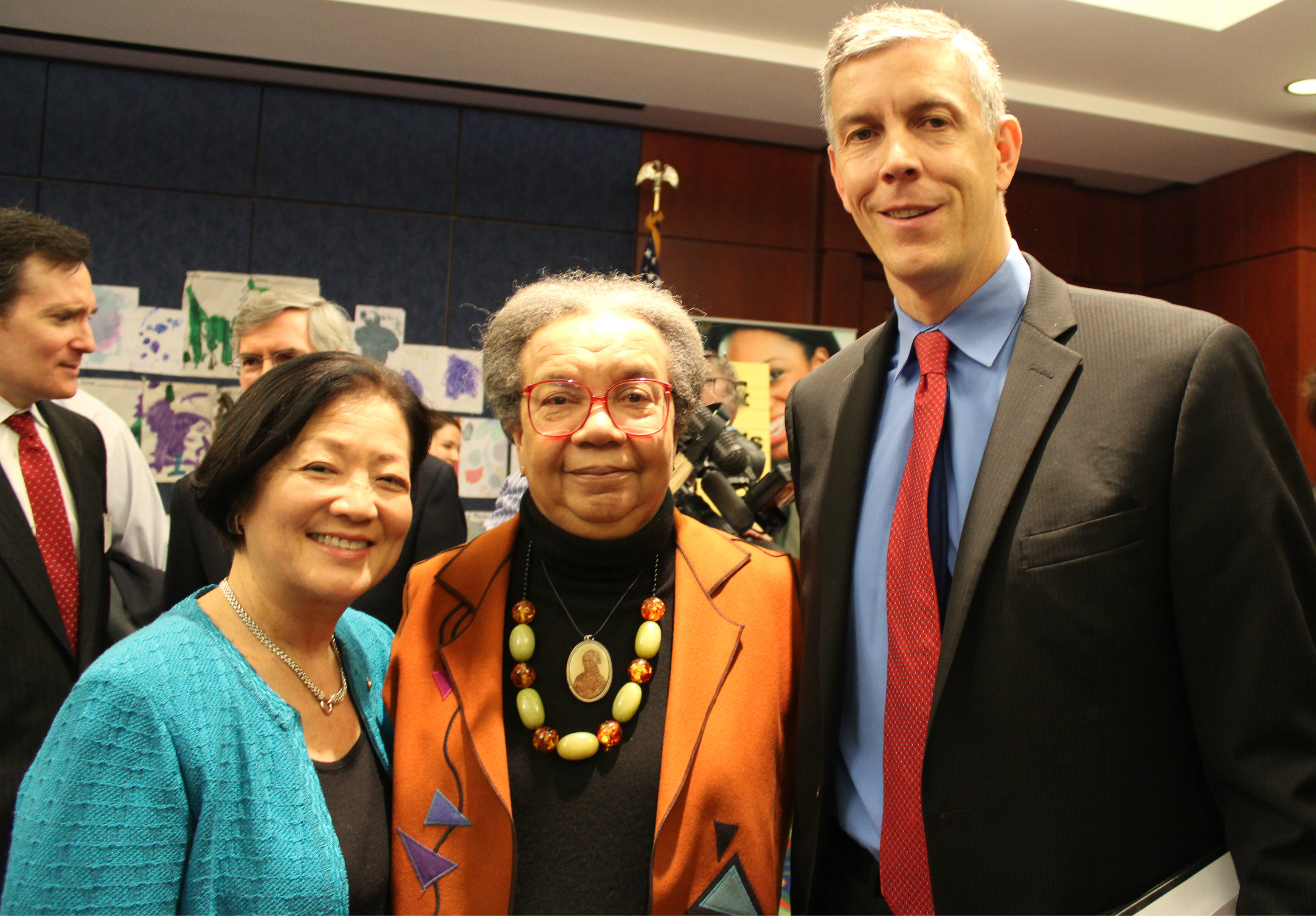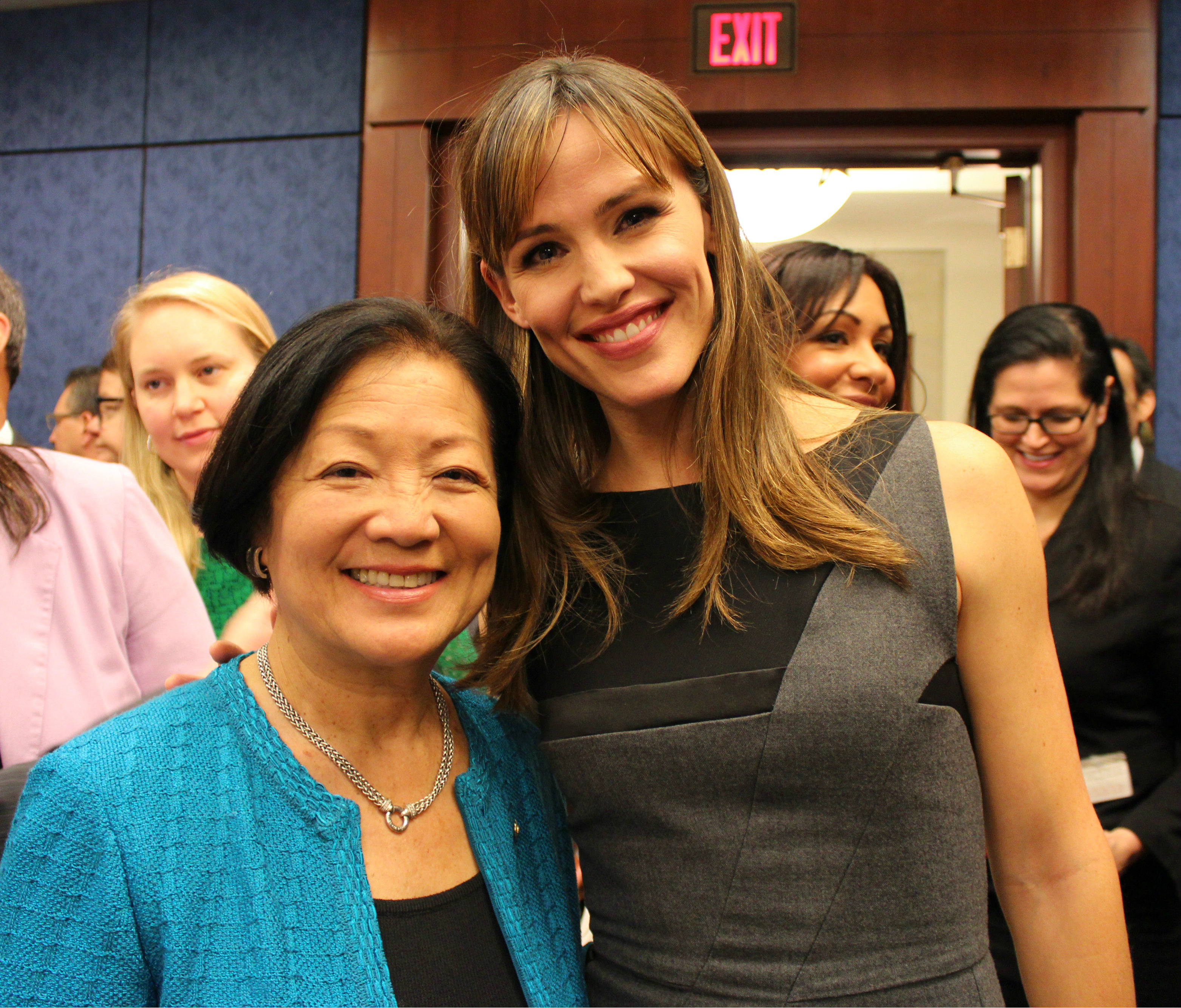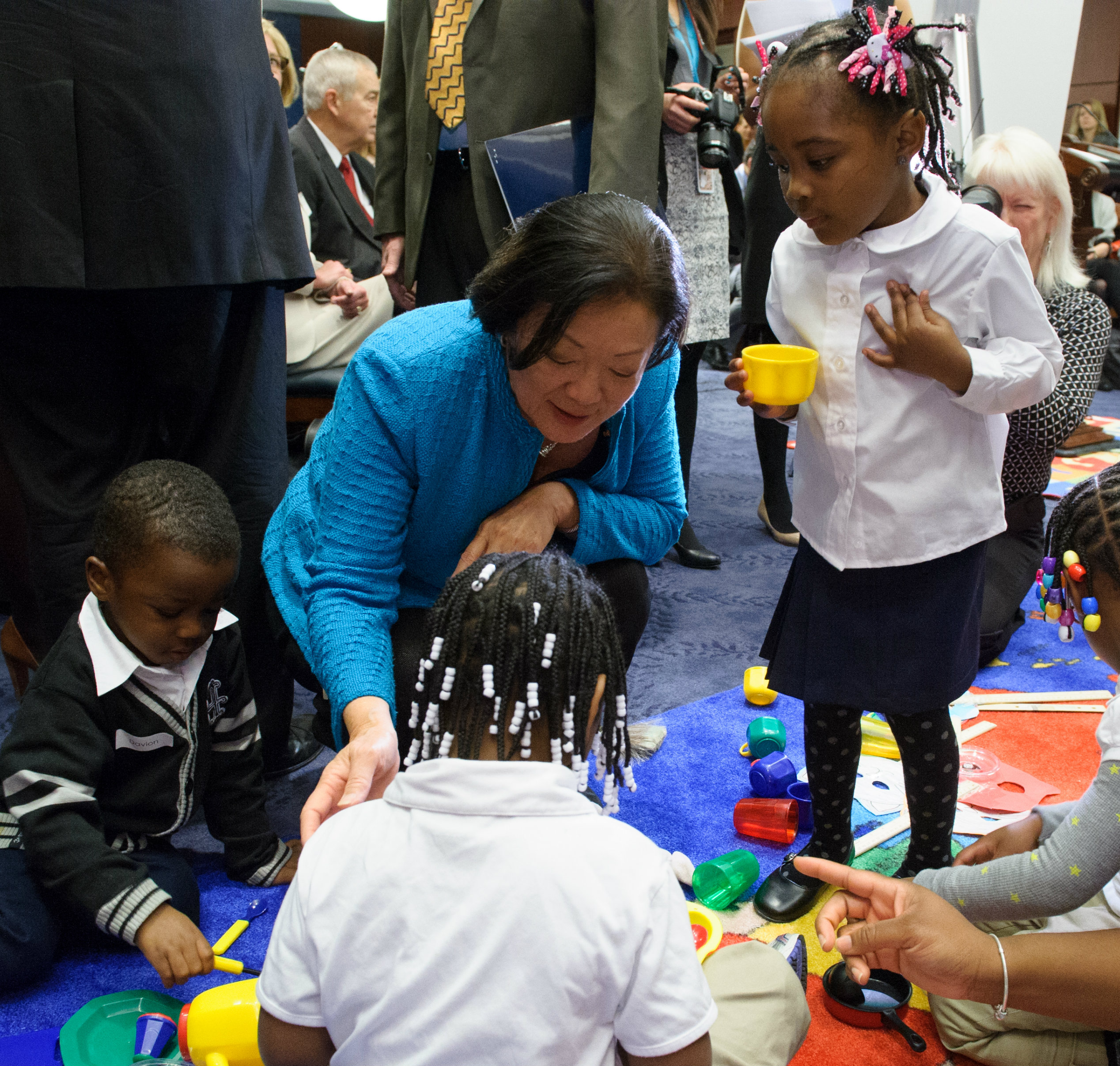HIRONO JOINS BIPARTISAN GROUP OF COLLEAGUES TO EXPAND ACCESS TO HIGH-QUALITY EARLY LEARNING PROGRAMS
Washington, D.C. – Senator Mazie K. Hirono today joined a diverse coalition of lawmakers, advocates and military leaders to introduce the Strong Start for America’s Children Act, legislation to expand access to high-quality early learning programs for children from birth to age five. Building on the framework put forward by President Obama in his 2013 State of the Union address, the bill focuses on four key goals: boosting funding for high-quality preschool programs serving low- and moderate-income families; increasing the quality of infant and toddler care offered by providers; supporting broad-scale quality improvements to child care programs; and encouraging continued support for the Maternal, Infant, and Early Childhood Home Visiting (MIECHV) program.
“Early learning opens up doors of opportunity for all students, establishing a foundation for success in school and in life. The investments we make in our youngest keiki are paid back in full by enhancing our nation’s competitiveness in the global economy. The Strong Start for America’s Children Act partners with states to build and expand their support for our youngest learners. I am glad that key elements from my PRE-K Act were included to help states like Hawaii create effective, quality state preschool programs. Mahalo to President Obama, Secretary Duncan, Chairman Harkin and the educators, business executives, military leaders and law enforcement officials who have made early education a priority,” said Hirono.
Hirono was able to insert several key measures in the bill from her previously introduced Providing Resources Early for Kids Act (PRE-K Act), including Preschool Development Grants to enable states to start up and expand their system and increased funding for Native Hawaiian students. Along with Hirono, the Strong Start for America’s Children Act was introduced by Senators Tom Harkin (D-IA), Patty Murray (D-WA), Robert P. Casey, Jr. (D-PA), Bernie Sanders (I-VT), Chris Murphy (D-CT), Tammy Baldwin (D-WI), Elizabeth Warren (D-MA), Chris Coons (D-DE), Tim Kaine (D-VA), Kirsten Gillibrand (D-NY), and Ron Wyden (D-OR). Similar legislation was introduced in the U.S. House of Representatives today by Rep. George Miller, senior Democrat on the House Education and Workforce Committee, and Rep. Richard Hanna (R-NY).
The bill was endorsed by the American Federation of State, County, and Municipal Employees (AFSCME), Child Care Aware, Children’s Defense Fund (CDF), Council for Exceptional Children, Easter Seals, Learning Disabilities Association of America, Moms Rising, National Association for the Education of Young Children (NAEYC), National Association of Elementary School Principals (NAESP), National Association of State Directors of Special Education (NASDSE), National Education Association, National Head Start Association, National Parent Teacher Association (PTA), National Women’s Law Center, Parents as Teachers, Ready Nation/America’s Promise Alliance, Save the Children, Service Employees International Union (SEIU) and Zero to Three.
Hirono hosted nearly 25 local education and business leaders today on a conference call to answer questions and explain how the legislation will affect Hawaii keiki.

Hirono pictured with founder and president of the Children’s Defense Fund Marian Wright Edelman and U.S. Secretary of Education Arne Duncan.

Hirono pictured with actress and early childhood education advocate Jennifer Garner.

Hirono pictured with local D.C. preschool students.
####
|
FOR IMMEDIATE RELEASE |
Contact: Harkin Press Office: 202-224-3254
|
Harkin, Senate Democrats Introduce Legislation to Expand Access to High-Quality Early Learning Programs
WASHINGTON, D.C.— Senator Tom Harkin (D-IA), Chairman of the Senate Health, Education, Labor, and Pensions (HELP) Committee—along with Senators Patty Murray (D-WA), Robert P. Casey, Jr. (D-PA), Bernie Sanders (I-VT), Chris Murphy (D-CT), Tammy Baldwin (D-WI), Elizabeth Warren (D-MA), Mazie Hirono (D-HI), Chris Coons (D-DE), Tim Kaine (D-VA), Kirsten Gillibrand (D-NY), and Ron Wyden (D-OR)—today introduced the Strong Start for America’s Children Act, legislation to expand access to high-quality early learning programs for children from birth to age five. Similar legislation was introduced in the U.S. House of Representatives today by George Miller, senior Democrat on the House Education and Workforce Committee, and Rep. Richard Hanna (R-NY).
Building on the framework put forward by President Obama in his 2013 State of the Union address, the bill focuses on four key goals: boosting funding for high-quality preschool programs serving low- and moderate-income families; increasing the quality of infant and toddler care offered by providers; supporting broad-scale quality improvements to child care programs; and encouraging continued support for the Maternal, Infant, and Early Childhood Home Visiting (MIECHV) program.
The early childhood education proposal is a 10-year initiative to expand and improve early learning opportunities for children across the birth to age 5 continuum. The bill would fund preschool for 4-year old children from families earning below 200% of the federal poverty level, and encourage states to spend their own funds to support preschool for young children with family incomes above that income level. The legislation would establish a new federal-state partnership with formula funding for 4-year old preschool, with a state match, to all eligible states, based on each state’s proportion of 4-year olds under 200% of the federal poverty level. States would provide sub-grants to high-quality, local providers, including school districts and community-based providers, such as child care and Head Start programs. The bill also authorizes a new Early Head Start partnership with child care to improve the quality of care for infants and toddlers.
“Learning begins at birth, and the preparation for learning begins before birth. The investment we make as a nation in early learning will pay dividends for generations to come,” Harkin said. “Decades of research tell us that from infants and toddlers to preschoolers, early learning is the best investment we can make to prepare our children for a lifetime of success. Today, 39 states and the District of Columbia offer state-funded early learning programs, but without stronger investments, millions of children will continue to go without access to these crucial programs. No child should be denied this opportunity because of family income or where they live.
“Our bill will help to build on and accelerate the progress already made in states led by Democratic and Republican governors alike. Expanding access to high-quality preschool and infant and toddler care programs will be a much-needed hand-up for working parents and their children around the country,” Harkin added.
“As a former pre-K teacher, I’ve seen in my own classroom that when young children get the attention they need, they’re miles ahead of their peers on the path to success,” said Murray. “While other countries are investing billions in early education, we can’t allow any American children to fall behind, so I’m thrilled that members of both parties have come together to support access to quality early learning programs for every one of our kids.”
“One of the most important steps we can take for our economy and our children is to invest in early education,” Casey said. “Having access to pre-K will better prepare our children in an increasingly competitive global economy. Every child deserves a chance to develop their talents, and pre-K is essential to doing that.”
“As our nation struggles to recover from the worst economic crisis since the great depression, many parents are struggling to provide their children with the high quality early care they need. This legislation would make an historic investment in early childhood education, and ensure that all children, regardless of their family's background, have the educational opportunities that will lead to success later in school and in life,” Sanders said.
“As the father of a 2 year old and a 5 year old, these days I'm particularly aware of the benefits early childhood education provides for infants, toddlers, and preschoolers," said Murphy. “Countless studies have shown what parents already know: that these early years are critical for a child's development and success in the long run. This bill invests in essential early childhood education for children across the country, regardless of where they live or how much money their parents make. I'm confident that the investments our bill makes will not only greatly improve a child's quality of life in the early years, but will also set them up for educational success as they get older.”
“In Wisconsin, we have a long history of making strong investments in our schools because we understand that a quality education helps build a strong middle class,” Baldwin said. “We must make it a priority to invest in early education for student and families, so we open the doors of opportunity to every child and help provide them the skills they need to get ahead and realize their dreams. I’m proud to join this effort to strengthen our commitment to the foundation that early childhood education provides our children. This is an important investment in a stronger future.”
“When we invest in early childhood education, we’re investing in our nation’s future. Early childhood education helps children grow and learn from the very beginning, and helps make sure all our kids have a fair shot to succeed in school. This legislation will support efforts in Massachusetts and across the country to strengthen early education programs and increase families’ access to early learning opportunities,” Warren said.
“Early learning opens up doors of opportunity for all students, establishing a foundation for success in school and in life. The investments we make in our youngest keiki are paid back in full by enhancing our nation’s competitiveness in the global economy. The Strong Start for America’s Children Act partners with states to build and expand their support for our youngest learners. I am glad that key elements from my PRE-K Act were included to help states like Hawaii create effective, quality state preschool programs. Mahalo to President Obama, Secretary Duncan, Chairman Harkin and the educators, business executives, military leaders and law enforcement officials who have made early education a priority,” said Hirono.
“We owe it to our children to give them every chance to succeed in school and beyond,” Coons said. “Too often, children enter elementary school already lagging behind classmates who have developed critical skills in prekindergarten programs. This bill will help more children access high quality early-learning programs and enter the classroom prepared to reach their full potential. These are investments in a brighter future for our children, and every child, regardless of income, deserves the opportunity for a strong start.”
“I have always been a believer that investing in early childhood education will pay huge dividends for our children and for our nation as a whole,” said Kaine. “As Governor, I expanded the number of kids served by quality pre-k programs by 40 percent and I am proud to join my colleagues today in strong support of a bill that will expand early childhood education access for children across the country. It is imperative that we continue to make investments in programs that help close the achievement gap between children of all backgrounds. Ninety percent of brain development occurs before a child’s fifth birthday, and we know that by instilling an early joy and respect for learning, we can maximize the potential of every child in our nation.”
“If we expect our children to walk through the doors of our colleges and universities tomorrow, and succeed in our economy in the years ahead – we need universal pre-k,” said Gillibrand. “High quality early learning leads to strong cognitive, social, emotional and language development – key skills for a bright future. But for millions of children in struggling families – that is a chance they will never get – through no fault of their own, and for no other reason, than they were born into a life of less opportunity. The block you live on should not determine what chances you get in life. That’s why we need to make the investment today to bring quality, affordable, pre-k to every child in America.”
“In order to close the learning gap by kindergarten, all children need and deserve access to high-quality early education,” Wyden said. “Despite its value and success, investment in pre-kindergarten has fallen far short of where it needs to be. Improving the American education system has no simple fix, but requires a thoughtful, cradle-to-career approach with access to high quality pre-K as its core. I applaud the leadership of Chairman Harkin in advancing this important goal.”
“The early learning bill introduced today reflects a growing, bipartisan understanding that, to ensure our nation’s children have the educational and economic opportunities they deserve, we must act early. It’s long been clear that high-quality early learning opportunities produce lasting benefits, including higher high school graduation rates and lower incarceration rates,” said U.S. Education Secretary Arne Duncan. “Now, a broad coalition is calling for action on President Obama’s plan to make quality preschool available to every 4-year-old in America, drawing on the example of leading states. Earlier today, Democrats and Republicans, including Sen. Harkin, Rep. Miller, and Rep. Hanna stood with leaders from law enforcement, business, the military, and early childhood education advocates to call for action—and to invite others to join this vital effort. This is the most important single step we can take for the future of our young people. Let’s join together to make it happen.”
See a summary of the bill here.
See a fact sheet on the bill here.
See a list of national organizations supporting the bill here.
As Chairman of the HELP Committee, and as Chairman of the Appropriations Subcommittee on Labor, Health and Human Services and Education, Harkin has long championed early-childhood education programs, and has demonstrated a commitment to providing resources to improve access to, and the quality of, early-childhood education, including through Head Start, the Child Care and Development Block Grant and the Race to the Top-Early Learning Challenge.
Earlier this year, Harkin led the passage by the HELP Committee of the Strengthening America’s Schools Act (SASA), which would direct states to develop guidelines for early education learning, provide greater access to high-quality literacy instruction for children in early education programs, encourage every state to provide full-day kindergarten, and ask elementary schools that are among the lowest-achieving to develop or expand early childhood education to help prepare children for success.